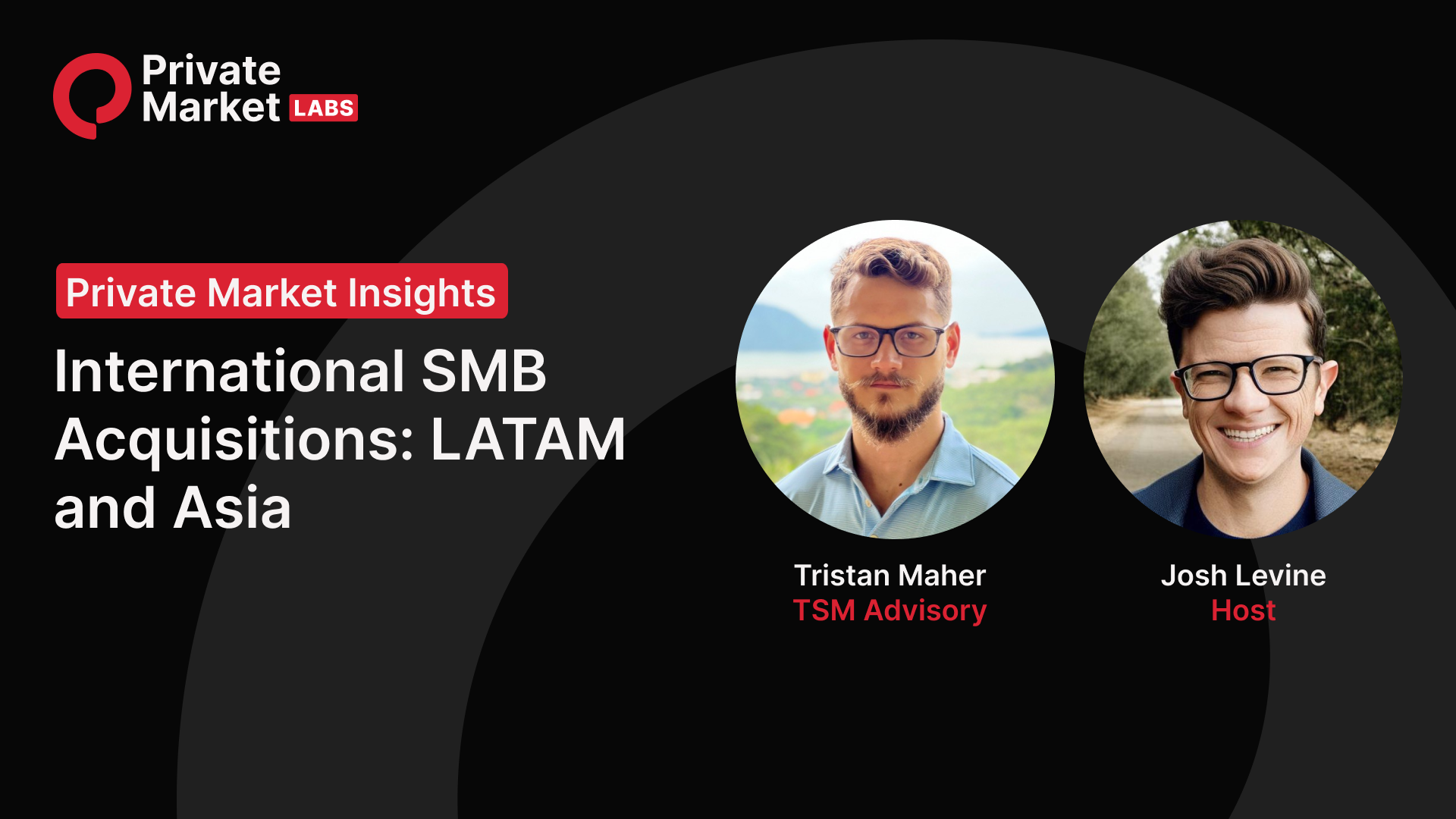The 29th episode of Private Market Insights focuses on the complexities of international SMB acquisitions. Our guest is Tristan Maher, an expert in the field with hands-on experience in deals outside North America. The discussion explores the nuanced challenges of conducting international SMB deals, emphasizing the importance of integrating into local cultures and understanding each country’s distinct legal and financial landscapes. Tristan shares insights on the importance of solid legal representation and thorough research, especially in Asia, where he also recounts a fascinating story that involves the local mafia.
This episode offers invaluable perspectives for those considering or currently engaged in international M&A, highlighting strategies for successful navigation and integration into foreign business environments. For additional insights from Tristan on topics such as due diligence and the importance of M&A education, we highly recommend you watch the full episode:
International Deals: Operator Mindset vs. Financier Mindset
In the US, deep capital markets and investor-focused MBA programs foster a “financier’s mindset” among SMB buyers and investors. This approach encourages buyers to maximize shareholder value by viewing their acquisition as a financial asset. Internationally, a more prevalent “operator mindset” emphasizes the operating period in and of itself, rather than as a means to building wealth. This difference is subtle, but it can make a big difference in the acquisition process when it comes to how buyers engage with local business owners, how they integrate into the community, and how they raise capital.
Don’t Be a Tourist, Integrate into the Local Landscape
Investors must thoroughly understand the target country’s unique cultures, legal frameworks, and ownership restrictions. Spending significant time on the ground (Tristan recommends spending at least a year before buying), is essential for building relationships with the local business community. Integrating into the local community and overcoming language and cultural barriers can help investors avoid costly missteps. In contrast, “tourist investors” rush into deals without local knowledge, facing increased operational risks, legal challenges, and a higher chance of getting scammed.
Capital is Expensive, Labor is Cheap
In developing markets like Thailand, Tristan highlights how labor costs impact business strategy. Labor-intensive services become affordable, but capital-intensive operations, like those reliant on advanced technology, are more costly. This shapes business models, requiring careful adaptation by the foreign investor.
Do Your Research on Regional Investment Dynamics
It is important to recognize the diverse regulatory landscapes when conducting business in different countries, particularly in Asia. Tristan notes that countries like Singapore are extremely open to foreign investment and often ranked as one of the freest markets globally. This contrasts sharply with places like Thailand, where there are stringent restrictions on foreign ownership. For instance, foreigners should know that in Thailand, they cannot own property; instead, they are only permitted to lease it for a maximum of 30 years.
Understand Local Rules and Play Fair
A thorough understanding of local taxes and regulations is essential for successful foreign investments. Tristan illustrates this with a story about a relative who opened a pizza shop in Mexico without fully accounting for certain local financial obligations, which became a challenge. “Tourist investors” fail to grasp the informal rules that govern local business climates. Tristan advocates being a “good foreigner,” which means adding value to the community rather than adopting extractive business practices. This ethical approach prevents conflicts and helps with better integration into the local market.
Expect Challenges in Raising Capital Internationally
Accessing capital for SMB acquisitions is markedly more challenging outside the US, which boasts some of the deepest and most accessible capital markets. Mezzanine funds (learn more about them here) offer flexible financial products like convertible debt and can provide viable alternatives to US investors and government-backed programs like the SBA 7a loan program. International investors typically need a larger equity cushion due to the increased operational risks inherent in international markets. Convertible debt is particularly instrumental in countries with stringent foreign ownership laws, allowing investors to circumvent equity limitations and achieve greater control over their investments. This ensures compliance with local regulations and provides a strategic advantage in managing and directing the business.
Local Knowledge Can Even Save Lives
Experienced and well-connected local advisors are invaluable in navigating the complexities and potential dangers of the market. Tristan shares a fascinating personal story of how necessary local knowledge is for foreign investments. Planning to launch a jet ski rental business on an island’s less touristy beach, Tristan was unaware that he was encroaching on mafia-controlled territory. This potentially fatal misstep was avoided thanks to his local lawyer, who warned him of the potential consequences of his plan.
A Tip on How to Bridge the Cultural Divide
When finding reliable local guidance, particularly in legal matters, ideal candidates are often Western lawyers with extensive local experience or local professionals educated in the West who understand Western business practices, including unique aspects like the tax obligations of US citizens operating overseas. To build these essential relationships, Tristan recommends engaging in shared activities (in his case golf and MMA), which help forge connections with both fellow expatriates and culturally aware locals. This can facilitate the establishment of genuine partnerships to help you master the complex interplay of cultural and legal nuances in foreign markets.

